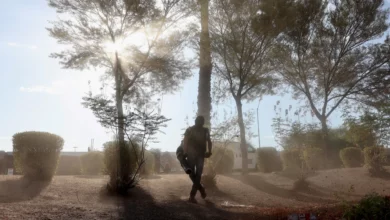Paris–UN climate talks tasked with curbing the threat of global warming are backsliding, delegates from both rich and developing nations said Friday at the close of a week-long session in Bonn.
Even as evidence mounts that deadly impacts are upon us, negotiators said, chances for a compromise deal under the 194-nation UN Framework Convention on Climate Change (UNFCC) are slipping away amid furious finger pointing.
"These negotiations have if anything gone backwards," said the EU's climate action commissioner Connie Hedegaard.
"This imbalance is not helpful and could seriously endanger the prospects of securing the successful outcome the world needs from the Cancun climate conference next December" in Mexico.
"At this pace the world will simply collectively miss the train," she warned.
Record global temperatures, forest fires in Russia, lethal floods in Pakistan "are all consistent with the kind of changes we could expect from climate change, and they will get worse if we don't act quickly," said US negotiator Jonathan Pershing.
"Unfortunately, what we have seen over and over this week is that some countries are walking back from the progress made in Copenhagen," he told journalists, referring to the 11th-hour accord hammered out at the climate summit in December.
The Copenhagen Accord enshrined the goal of capping the increase of global temperatures at 2.0 degree Celsius (3.6 degree Fahrenheit), but did not muster the commitments needed to attain it.
It also pledged long-term financing to the tune of 100 billion dollars a year to help poor countries green their economies and cope with climate change impacts, but without specifying where the money would come from.
Dessima Williams of Grenada, speaking for the 43-nation Association of Small Island States, said she was "greatly concerned" by the slow pace of the talks.
"The situation on the ground for all our countries is worsening," she said at a press conference.
But even in areas where agreement had been reached, such as technology transfer and forest management, "there seems to be some backsliding. This is very lamentable and very unhealthy," she said.
The likely failure of the US Congress to pass climate legislation this year has also cast a pall over the negotiations, many delegates said.
"I've heard a lot of people say it is not encouraging for the process," Wittoeck said.
Major emerging nations such as China and India have resisted legally binding requirements to cut emissions, saying that rich countries historically responsible for global warming must take the lead.
Efforts to hammer out a draft negotiating text ahead of the next major climate summit at the end of the year in Cancun also suffered a blow, with many countries throwing in last-minute additions.
Only one more negotiating session — from October 4-9 in Tianjin — remains before Cancun, which is expected, at best, to finalise some of the building blocks for a future, legally-binding deal.
The first six months of 2010 registered the warmest combined global land and ocean surface temperatures since 1880, when reliable temperature readings began, according the US government scientists.
Arctic ice cover — another critical yardstick of global warming — had also retreated more than ever before by 1 July, putting it on track to shrink beyond its smallest area to date.
Without steep cuts in greenhouse gas emissions, the global thermometer could rise by 6.0 degrees Celsius (10.8 degrees Fahrenheit) compared to pre-industrial levels, making large swathes of the planet unlivable, the UN's Intergovernmental Panel on Climate Change (IPCC) has warned.
Voluntary national pledges made in Copenhagen would likely cap that increase at 3.5 C to 4.0 C (6.3 F to 7.2 F), still fall far short of the 2.0 C (3.6 C) limit that most scientists agree is the threshold for dangerous warming.




